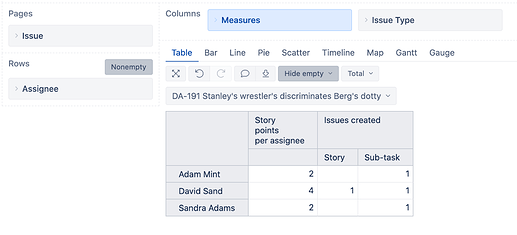Hi All
I need to create a eazyBI report where it should show :
1)Total stories and subtasks assigned to a user
2) Total story points assigned to the user (Both Story & Subtask)
3) Condition - Story points should be shown based on subtasks eg
if Roma has a Story assigned of 8 points
But has 3 subtasks under the story as
Subtask 1 - Assigned to Roma - 2 points
Subtask 2- Assigned to XYZ-2 points
Subtask 3 - Assigned to ABC - 2 Points
Total Story points assigned to Roma in eazyBI report will be 2 (of Subtask) + 2 (of remaining Story) = 4
Please advise on this.
Thanks
Hi @romabakshi,
Welcome to the eazyBI community! 
To get all stories and subtasks that are assigned to a user you can use measure Issues created and drill into Issue type dimension.
For your second question - about story points assigned to the user is a bit tricky because of the condition you shared. In that case, you need to create a calculated measure in the Measure dimension.
-- story points assigned for subtasks
([Measures].[Story Points created],
[Issue Type].[Subtask issue types])
+
Sum(
Filter(
Descendants([Issue.Sub-task].CurrentHierarchyMember, [Issue.Sub-task].[Parent]),
-- filter issues that are assigned to the assignee in rows
([Measures].[Issues created],
[Issue Type].[Standard issue types])>0
),
-- get all SP from standard issue types
(
([Measures].[Story Points created],
[Issue Type].[Standard issue types])
-
-- subtracts all SP from all subtasks ignoring who is assignee
([Measures].[Story Points created],
[Issue Type].[Subtask issue types],
[Assignee].DefaultMember)
)
)
In this formula I am also using calculated members in Issue type for:
Standard issue types:
Aggregate(
Filter(
[Issue Type].[Issue Type].Members,
NOT [Issue Type].CurrentMember.GetBoolean('Subtask')
))
Subtask issue types:
Aggregate(
Filter(
[Issue Type].[Issue Type].Members,
[Issue Type].CurrentMember.GetBoolean('Subtask')
))
All together in the report, it would look like this (I created DA-191 based on your example about Roma, in my example, it is David Sand):
best,
Gerda // support@eazyBI.com

